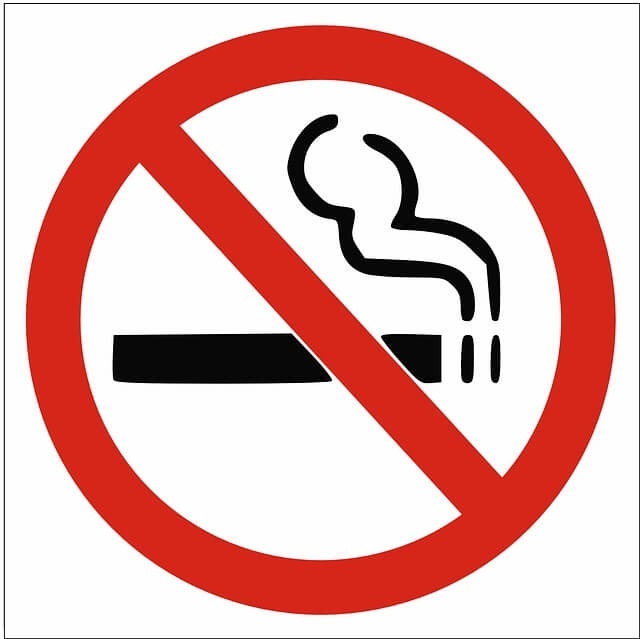Nationally speaking there has been a significant shift in the past two decades regarding policies surrounding smoking in public spaces such as workplaces, bars, and restaurants.
It is common knowledge that smoking poses serious health risks.
In fact, it is so serious that the American Cancer Society claims that up to 30% of all cancer deaths are caused by tobacco use.
This same organization estimated last year that 10,500 people were expected to die of cancer in Maryland alone. That equals out to 3,500 possible cancer diagnoses that may be attributed to tobacco use.
However, smoking is a legal and often private activity.
Though smoking has in fact been banned in many public places citing the health safety of innocent passers-by (much to the satisfaction of non-smokers), many people would still agree that smoking should not be a restricted activity in the privacy of their own homes whether renting or not.
In fact, with 1 in 5 adults or teens in Anne Arundel County being smokers, there is an ever-growing sense that landlords are burdening those renting homes with smoking restrictions in their rental properties.
So the question remains: should landlords of single-residence homes or individual units of a multi-housing building ban smoking in their rental properties or not?
Maryland Laws and Regulations

As of right now, under the Maryland Clean Indoor Air Act, smoking indoors in public places, including restaurants and bars, is strictly prohibited.
This act also includes areas such as:
- An indoor area open to the public
- An indoor meeting place open to the public
- Indoor places of employment
- Mass transit vehicles
- Private homes and residences being used by a licensed day care or child care provider
- Private vehicles used for the public transportation of children or as part of health care or day care transportation
- Clubs with alcohol licenses
Taking it one step further are counties such as Anne Arundel County.
Recently the Housing Commission of Anne Arundel County implemented an ordinance clearly prohibiting smoking in indoor and common areas to multi-family housing units. Common area restrictions can include areas such as the grounds, pool area, parking lot and premises as a whole, or may relate specifically to entrance ways and confined areas such as laundry rooms and mail rooms. These restrictions will be clearly spelled out by the ordinance or building policy and will be included in your tenant’s signed lease agreement.
Note however, that this ban does not extend to not residents’ individual units, nor does it apply to single-family residences. This choice falls upon the landlord or property management group.
Another point of contention nationwide is whether to prohibit smoking in low income public housing, regardless of whether it is in a common area or individual unit.
Although a largely contested topic, Maryland has taken a hard stance against allowing smoking in such housing, and prohibits smoking within common areas of such housing, though there are no ordinances supporting the prohibition of smoking within the home at this time. However, the fact that many private landlords rent public housing units lends to the fact that landlords are in fact in charge of deciding whether to allow smoking within the home or not.
It is also worth mentioning that the Department of Housing and Urban Development (HUD) has issued multiple statements encouraging the implementation of smoke-free policies in public housing units.
Citing that “Additional paint to cover smoke stains, cleaning of the ducts, replacing stained window blinds, or replacing carpets that have been damaged by cigarettes can increase the cost to make a unit occupant ready,” as some of the pressing reasons to consider stricter smoking ban policies, HUD has made a major effort not only throughout the Maryland itself but the entire country to prohibit smoking in as many places as possible.
Truth be told, whether renting an individual unit within a multi-housing building, a single-family residence in a quiet neighborhood, or a home that falls under the label of public housing, there is a large incentive for landlords to implement smoking bans within their rental homes.
Consumer demand, health concerns, reduced fire hazards, lower insurance costs, and decreased cleaning costs, despite not being legally required to do so, are just some of the reasons landlords may begin to follow this growing trend.
Tenants versus Landlords: Rights Against Smoking Bans
Smokers, have few rights with regard to smoking restrictions in the homes they rent from landlords.
Since smoking is considered a choice and a privilege, rather than an inherent characteristic such as race, age, or disability, smoking bans within rental homes are not considered discriminatory under the law. Simply put: smokers are not a protected class.
Landlords can prohibit smoking the same way they can prohibit pets, waterbeds, or excess noise; and they can do so in individual units or their single-family rental home. They can even evict smokers who violate a non-smoking lease agreement, just like they can for any other lease-breaking activity.
While neither you nor your Anne Arundel property management company can change the smoking policies of your rental home in the middle of your tenant’s lease, many landlords who choose to shift to smoke-free rental homes simply include a smoking ban policy in each lease as it comes up for renewal.
Interestingly, the Maryland Condominium Act, responsible for regulating the management of condominiums in Maryland, contains bylaws regarding the use and maintenance of individual units and their common elements.
It was recently decided by the Maryland Attorney General’s Office that any condominium board may regulate smoking in individual units as well as common areas so long as the above-mentioned bylaws are not being violated.
Should you be renting out individual units of a multi-housing building, such as a condominium, that becomes smoke-free, those tenants that are smokers can be grandfathered in until their lease renewal is due. You can then enlist your Anne Arundel property management company to restructure the lease to include the smoking bans according to the building’s new regulations and Maryland law.
Health Hazards
Lastly it is important to note, that despite the cosmetic effect smoking can have on your rental property, according to the American Lung Association, smoking poses critical health hazards to those around secondhand smoke.
In multi-housing buildings, smoke can migrate from other units and common areas traveling through doorways, cracks in walls, electrical lines, plumbing, and ventilation systems, and entering another tenant’s unit causing severe respiratory issues.
Tenants with serious disabilities may find they have legal protection under the Americans with Disabilities Act and the Fair Housing Act when it comes to secondhand smoke entering their home from another unit.
This alone may incentivize landlords to keep their rentals smoke-free due to their legal obligation to take reasonable steps to prevent such harm from coming to another individual.
Debating things such as severe damage to your rental property, the increased risk of fire hazards and injury, higher insurance premiums, and ultimately the health of not only your prospective tenant but those around such person(s), landlords should take a serious look at prohibiting smoking in their rental properties.
Conclusion
Should you decide to designate your rental home a smoke-free residence the U.S Department of Housing and Urban Development (HUD) offers the following advice to landlords:
- Talk to prospective tenants about your smoke-free policies when showing your property
- Include no-smoking policies in lease agreements and read through the related rule(s) with your tenants as they sign their lease
- Display no-smoking signage in buildings and on your property
- Consider partnering with organizations to offer smoking cessation support to residents
- Inform tenants that if they smoke in their units, they will be financially responsible for the costs of restoring the unit
- Use the same warning and enforcement methods for smoke-free rule violations used for any other lease infractions
- Visit and inspect properties regularly
In the end, there are several reasons you may want to consider smoking bans within your rental property.
Though the choice is ultimately yours, your Anne Arundel property management group is there to help your design the perfect lease for you should you decide to prohibit smoking in your rental property.
By eliminating smoking within your rental home you not only preserve the condition of your rental home, but you may also play a role in eliminating secondhand smoke — a significant cause of residential fires and a major cause of preventable illness and death in the U.S.
